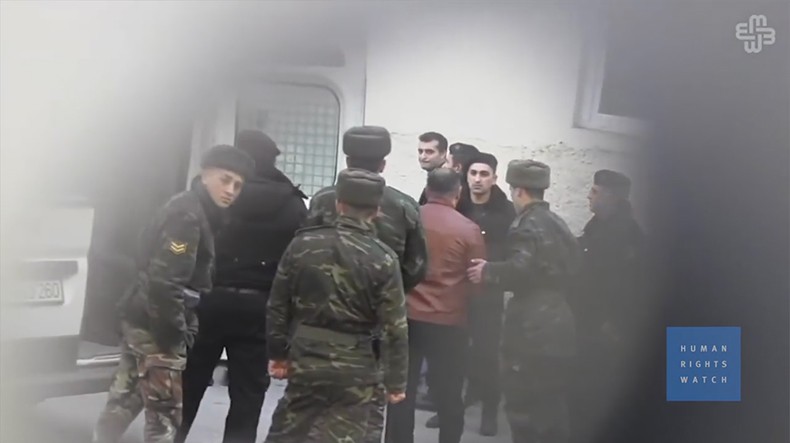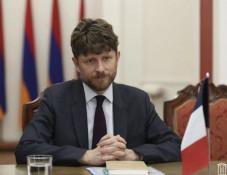
World Report 2016: Human Rights Watch sums up past year’s repressions against democracy in Azerbaijan
The Azerbaijani government’s unrelenting crackdown decimated independent nongovernmental organisations (NGOs) and media. Courts sentenced leading human rights defenders, political activists, and journalists to long prison terms in politically motivated, unfair trials. Dozens more face harassment, have been imprisoned, are under criminal investigation, face travel bans, or have fled. The authorities denied entry to international human rights monitors and journalists, according to the World Report 2016 by Human Rights Watch (HRW), an international rights group.
The government continues to bring false charges against critics in politically motivated prosecutions to silence and imprison them. Common charges used by the government include hooliganism, drug possession, treason, and so-called economic crimes. This practice reached a peak in 2015, with dozens of human rights defenders, journalists, political activists, and other critics prosecuted, convicted, or remaining in prison in this manner, the group points out.
The report includes the cases of human rights defenders Intigam Aliyev, Leyla Yunus and her husband, Arif, and Rasul Jafarov; prominent investigative journalist Khadija Ismayilova; Seymur Haziyev, a columnist for the opposition newspaper Azadlig; opposition Musavat party members Siraj and Faraj Kerimlis; Popular Front Party member Murad Adilov; political analyst Ilgar Mammadov; journalist Tofig Yagublu; Anar Mammadli, the head of the Election Monitoring and Democracy Studies Centre, and others. They were all imprisoned on politically motivated charges, according to the rights watchdog.
Next, Human Rights Watch refers to the practice of persecuting journalists applied in the country. Azerbaijan’s bar association disbarred or punished several lawyers representing human rights defenders and activists. In several cases, prosecutors summoned lawyers as witnesses in the cases they were representing and removed the lawyers due to alleged conflict of interest. On July 10, a Baku court disbarred human rights lawyer Khalid Bagirov for alleged misconduct after questioning the court’s decision against his client, Ilgar Mammadov. Also in July, a court disbarred Alayif Hasanov, following a defamation suit after he publicised alleged beatings of Leyla Yunus by her cellmate.
As for the freedom of media, the group writes about the case of Rauf Mirgadirov, a journalist accused of espionage charges. In December 2014, authorities raided Radio Azadlig’s Baku office, interrogated employees, seized equipment, and sealed off the premises. Several staff members fled the country. In February 2015, authorities forbade Radio Azadlig journalist Babek Bakir from travelling abroad due to a travel ban. In the report, there is also a reference made to the persecution of the journalists of the online Meydan TV, and to the case of the founder of the Institute for Reporters' Freedom and Safety, Emin Huseynov, who fled to Switzerland fearing a politically motivated arrest.
In December 2014, the parliament of Azerbaijan approved amendments prohibiting foreign media funding and authorising the court-ordered closure of any outlet that disseminates incorrect information twice within a year.
According to the HRW report, torture and ill-treatment continue with impunity in the country. On August 20, Bahruz Hajiyev died in a Mingechevir police station soon after police detained him for questioning. The Interior Ministry said that Hajiyev threw himself from a window. Hajiyev’s relatives reported that his body showed signs of other violence. In December 2014, Elshad Babayev died in prison. Babayev’s sister released photographs of the body with apparent signs of violence. Authorities opened a criminal case, but no one has been identified as responsible for his death.
In July and August, Ilgar Mammadov publicly alleged he had been attacked by fellow inmates for refusing to sign a letter of repentance to President Aliyev. In August, the secretary general of the Council of Europe (CoE) sent a letter to the justice minister urging a thorough investigation. Mammadov said that prison officials beat him in October. Authorities failed to effectively investigate.
HRW highlights that in April, the United Nations Subcommittee on Torture conducted a visit and found the government did not guarantee “all fundamental legal and procedural safeguards” to prisoners, “including access to a lawyer, a medical doctor, and to contact his or her family.”
The Office for Democratic Institutions and Human Rights of the Organisation for Security and Co-operation in Europe (OSCE/ODIHR) refused to send its observation mission to the November 1 parliamentary elections, citing the government-imposed restrictions on the mission. ODIHR had previously said that the election environment was negatively impacted by detentions, lawsuits and other pressure on journalists. The European Parliament and the OSCE Parliamentary Assembly also refused to send observers. The Council of Europe Parliamentary Assembly’s limited observation mission said the vote was “generally in line with international standards,” but three of its observers dissented, citing the lack of “conditions for holding free and democratic elections,” HRW points out.
The watchdog further reminds about the EU’s report on Azerbaijan’s implementation of the European Neighbourhood Policy, which found “regression” on human rights and fundamental freedoms. The United States State Department issued several statements condemning prosecutions of human rights defenders. In May, media reports revealed that the state-owned oil company, SOCAR, had secretly funded a 2013 trip to a conference in Baku and expensive gifts for 10 US Congress members and 32 of their staff members. Following the trip, a provision favourable to SOCAR and other oil companies was inserted into US legislation. After the investigations, participants returned the gifts.
Next, the report cites a June resolution by the Parliamentary Assembly of the CoE condemning “the crackdown on human rights in Azerbaijan” and calling for an end to “systemic repression.” In October, the secretary general announced the organisation’s withdrawal from a human rights working group with Azerbaijan, citing the deterioration of the situation of human rights defenders.
At the June UN Human Rights Council, 25 states, led by Ireland, condemned the “systematic silencing of critical voices” in Azerbaijan, and called for “immediate and unconditional release” of government critics. On August 20, six UN experts issued a joint statement condemning the Yunuses’ conviction as “manifestly politically motivated” and called for an end to “persecution against human rights activists” in Azerbaijan. In September, the UN high commissioner for human rights condemned the crackdown and called for the release of government critics.
In March, the UN Committee on the Elimination of Discrimination against Women criticised the delay in ratifying the CoE’s convention on violence against women; a lack of adequate measures to address violence against women and child marriage; as well as restrictive NGO laws and the arrest of and interference with women journalists and activists.
Giorgi Gogia, South Caucasus director at Human Rights Watch, said that the government’s crackdown in Azerbaijan is unprecedented in the country’s post-Soviet history, and that although the government is opening the country for international sporting and other events, it is closing the country to human rights scrutiny.
“The absence of serious international response to Azerbaijan’s draconian crackdown undermines European human rights standards,” Gogia said. “International entities, in particular the European Union and its members, should develop a consistent strategy to get the Azerbaijani government to carry out its human rights obligations.”
Related news
Newsfeed
Videos






























